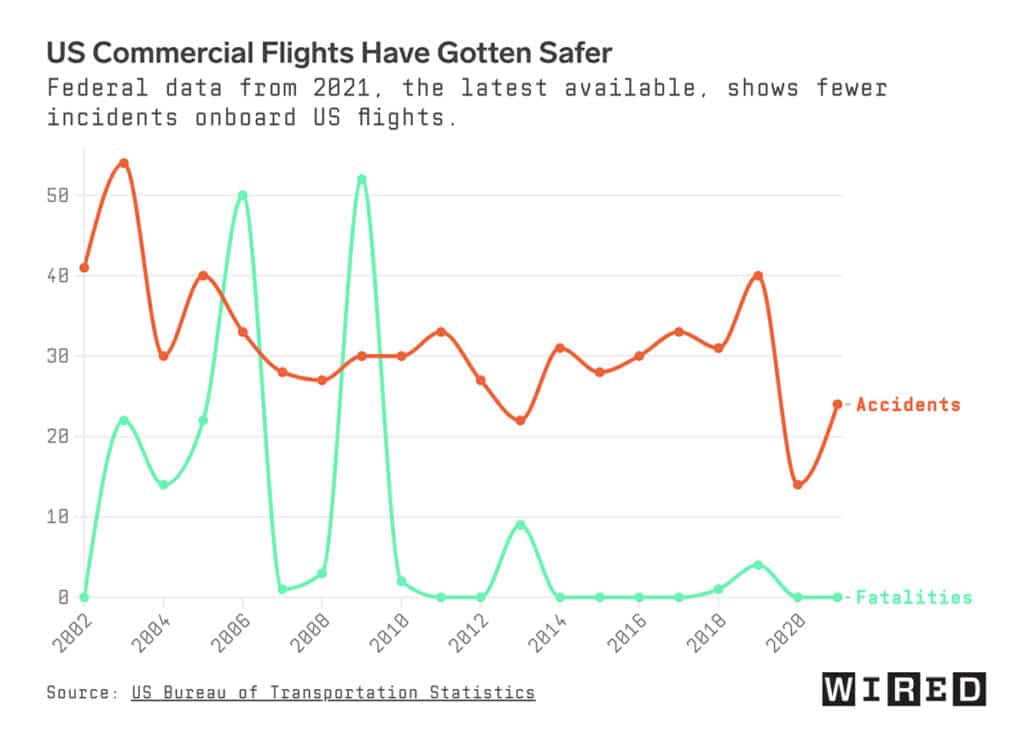Volcanoes are erupting in The Philippines, but on-fire Australia received some welcome rain. The Iran war cries have been called off and The Donald’s military powers are about to be hamstrung by the Senate. Meanwhile, his impeachment trial is starting, and we’re all on Twitter for a front-row seat.
What Could Go Right? Two Things That Are Better than They Seem
If you were only going off of headlines
This is our weekly newsletter, What Could Go Right? Sign up here to receive it in your inbox every Thursday at 5am ET. You can read past issues here.
We have covered the two topics below in the past, here and here, but they are circulating in the news again now, so we are recirculating them, too.
“Don’t let the Boeing headlines fool you”
The airplane manufacturer Boeing has been facing the heat since January, when an exit door of a Boeing 737 MAX 9 blew off a few minutes after takeoff and it was discovered that the four bolts meant to secure the door plug were missing. The plane made an emergency landing and no one was severely injured. The MAX 9s remain grounded after a Federal Aviation Administration audit.
Then, as this Wired article summarizes, several other aviation incidents followed, from a wheel falling off to an engine issue that caused a spurt of fire.
The other day a friend sent the following joke to a group thread we have on Instagram. The caption says, “No thanks I’ll walk.”

I laughed, of course. And as a nervous flier, I am one of the “If it’s Boeing, I ain’t going” customers when it comes to the MAX models specifically.
But I also can’t resist a Progress Network-style reminder, courtesy of the same Wired piece, that flying on an airplane is very safe, and has become even safer in the last decade.

It is even, despite what social media may tell you, safer than walking. Thousands of pedestrians die every year in the United States.
“Maternal death rates may be sharply overstated”
I wrote about this in January, based on a 2021 study of an investigation by The National Center for Health Statistics (NCHS), a unit of the Centers for Disease Control (CDC). Now, outlets from Vox to Fox are covering a new study, published in the American Journal of Obstetrics and Gynecology, that backs up the 2021 study’s main claim that skyrocketing maternal death rates, which the CDC most recently pinned at 23.6 per 100,000 live births, are the result of inaccurate data collection.
NCHS introduced a pregnancy checkbox in 2003 that was meant to correct for missed maternal deaths. And it does—but it also picks up on deaths that occurred while a woman was pregnant, like non-pregnancy-related cancers, versus deaths that occurred due to the pregnancy or medical care around it.
It also introduced errors: the medical director of Louisiana’s maternal mortality review committee told NPR that “When we’re validating the cases, it’s very common that a 70 year old man—somebody checked the pregnancy checkbox and it will appear that that was a pregnancy-associated death when it was more of a clerical error.”
The 2021 study put the national maternal mortality rate at 8.7 per 100,000 live births. The new study, which only counted a death if a pregnancy-related cause was listed by the physician certifying the death, puts it at 10.4. For context, the average across other high-income countries is 10.9.
The CDC says that the study’s numbers are an undercount. Perhaps reality lies somewhere in the middle. Regardless, researchers both involved and uninvolved with the study say that the US can do better—but at least we’re not as out of step with our international peers as we have been lamenting.
Mainstream media makes for an excellent fall guy when it comes time to assign blame for the doom loop of negative internet vibes. It is often just as negative as critics say. But it is also indispensable, and full of journalists who love sniffing out a good story. I’d like to dole out the deserved credit for how much attention this study is getting from publications across the political spectrum.
Election Letters

2024 is going to be a whopper of an election year. Our friends at Zócalo Public Square are publishing a series, Election Letters, that will contextualize and personalize several of the big national elections that will occur, from Taiwan to Mexico.
This essay documents the (failed) run of an anti-war presidential candidate. Although Vladimir Putin won a fifth term last weekend, thousands inside of Russia haven’t given up hope of one day changing their political landscape. | Read now
By the Numbers
151: Nepal’s maternal mortality ratio (151 deaths per 100,000 live births), down from 536 in 1996. The goal is to reduce it to 70 by 2030.
50: The percentage of competitors in the Paris 2024 Olympics who will be women, making the upcoming Games the first to achieve gender parity for athlete participation.
48: The share of electricity generated by the Netherlands in 2023 that was from renewable sources.
Quick Hits
🌾 World food prices hit a three-year low, which could help ease food insecurity that spiked after Russia invaded Ukraine in 2022.
🏭 Germany’s greenhouse gas emissions declined by 10 percent in 2023. The country’s Climate Protection Minister says that they are on track to meet 2030 decarbonization goals.
🪸 A coral reef—the northernmost in the Pacific Ocean—has been discovered in Canadian waters whose composition scientists didn’t think could support coral life. And, while half of coral reefs worldwide have died since the 1950s, ones in Southeast Asia continue to thrive.
📰 The European Parliament has passed a new law aimed at preserving editorial independence and protecting journalists from government surveillance or punishment as part of efforts to force them to turn over sources.
🚨 Was there ever really a shoplifting spike in the US? Two public policy institutes, the Brennan Center for Justice and the Brookings Institution (both of which slant left) look into the data.
🧠 Two studies suggest that CAR-T therapy, which involves engineering a patient’s own immune cells to kill cancerous ones and which is approved in the US for treating a handful of blood cancers, may also work against a type of brain cancer.
🌲 Young people can apply to fill jobs with the American Climate Corps starting in April. Only a few hundred will be available to start, expanding to 20,000 over the course of a year, says the Biden Administration.
🙅 The US’ Environmental Protection Agency banned chrysotile asbestos, the only remaining form of asbestos used in the country, on Monday. It is most commonly found in specific spare automotive parts. There are also eight plants in the US that still use it to produce chlorine in order to disinfect drinking and wastewater.
📉 Cancer cases in the United Kingdom are rising for those aged 35 to 69, but 33–37 percent fewer are dying from the disease due to improved detection and treatment.
📈 Marriage rates are rebounding in the US post-pandemic. So too is the economy.
TPN Member Originals
(Who are our Members? Get to know them.)
- Don’t let your disgust be manipulated | The Atlantic ($) | Arthur C. Brooks
- No, the SAT isn’t racist | NYT ($) | John McWhorter
- Smarter ways to boost drug innovation | Slow Boring | Matthew Yglesias
- How to destroy democracy: Break public trust in its institutions, the presidency included | Lucid | Ruth Ben-Ghiat
- Moving past environmental proceduralism | Asterisk Magazine | Alec Stapp
 Is the global economy finally on the right track? | GZERO | Ian Bremmer
Is the global economy finally on the right track? | GZERO | Ian Bremmer- The Georgia election interference case | Tangle | Isaac Saul
- What Schumer and Biden got right about Netanyahu | NYT ($) | Thomas L. Friedman


